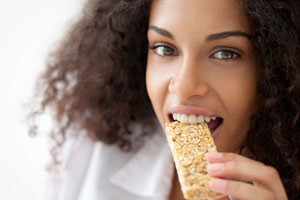You are what you eat, and your baby is too!
A healthy diet is essential to a healthy pregnancy. Poor nutrition during pregnancy is linked to preterm delivery, low birth weight infants and can predispose your baby to chronic health conditions later in her life. Not only is your health dependent on good nutrition but your baby’s is, too.
During pregnancy, you will need an additional 200-300 calories per day of your normal recommended caloric intake, but make them count!
Calcium
Foods high in calcium are important for baby’s bone and teeth development as well as your own circulatory and muscle systems. You will need 1000 mg of calcium daily. High calcium foods include:
- dairy products, such as milk, cheese and yogurts
- dark leafy green vegetables, such as spinach, kale and chard
- fortified cereals
- fortified juices
Vitamin D
Along with calcium, Vitamin D is essential to bone and teeth growth. You will need a least 600 international units of Vitamin D a day, but more if you live in an area with less sun exposure.
Sources of Vitamin D include:
- fortified dairy products
- fortified breads
- fortified juices
Protein
Protein is vital to your baby’s growth and development including cell and blood production.
Foods high in protein include:
- lean meats
- fish
- poultry
- eggs
- lentils
- peanut butter
- unsalted nuts and seeds
Iron
Rich iron foods are needed to prevent anemia, a condition that is very common during pregnancy. Red bloods cells need iron to carry oxygen rich blood throughout your body as well as baby’s. High iron foods include:
- whole grain products
- lean meats
- dark beans
- dark leafy green vegetables
- fortified cereals
Folic Acid
This Vitamin B product plays an important role in helping to prevent neural tube defects. It may also help prevent preterm delivery. Foods high in folic acid include:
- fortified cereals
- leafy green vegetables
- beans
- citrus fruits
Also remember
- Avoid any alcohol during pregnancy. No amount is OK.
- Limit you intake of salt. Too much salt can cause water retention and increase in blood pressure.
- Limit caffeine. Caffeine is a stimulant and does affect you baby.
